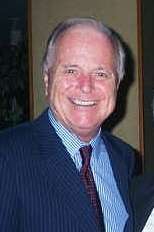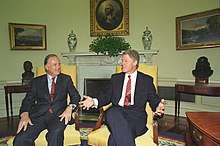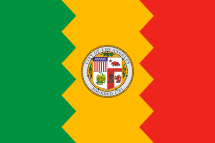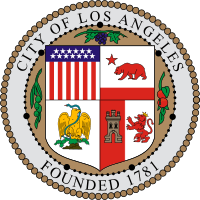Richard Riordan
| Richard Riordan | |
|---|---|
 | |
| 39th Mayor of Los Angeles | |
|
In office July 1, 1993 – July 1, 2001 | |
| Preceded by | Tom Bradley |
| Succeeded by | James Hahn |
| Personal details | |
| Born |
Richard Joseph Riordan May 1, 1930 New York City, U.S. |
| Political party | Republican |
| Spouse(s) |
Eugenia Warady (divorced) Jill Noel (divorced) Nancy Daly (divorced, deceased) Elizabeth Gregory |
| Children | five (two deceased)[1] |
| Residence | Los Angeles, California, U.S. |
| Alma mater |
Princeton University (A.B.) University of Michigan (J.D.) |
| Military service | |
| Allegiance |
|
| Service/branch |
|
| Years of service | 1952–1955 |
| Rank |
|
| Battles/wars | Korean War |
Richard Joseph Riordan (born May 1, 1930) is an American investment banker, businessman, and politician who served as the 39th Mayor of Los Angeles, California serving from 1993 to 2001. He is a member of the Republican Party. To date, Riordan remains the most recent Republican to serve as Mayor of Los Angeles.
Pre-political life
Riordan, an Irish-American, was born in Flushing, New York and raised in New Rochelle in Westchester County, New York.[2] He moved to Los Angeles to begin work as an attorney for the downtown law firm of O'Melveny & Myers in 1956, leaving in 1959 to become a partner of Nossaman LLP.
Mayor

When Los Angeles Mayor Tom Bradley announced his retirement, Riordan's interest turned to the 1993 mayoral election. It was to be a pivotal election for several reasons. Bradley had served in office for five terms, so the winner would be the first new face in two decades. During this time Los Angeles had witnessed a dramatic rise in crime, especially gang violence, traffic, and other problems damaging the city's quality of life. The booming economy of the previous three decades had fizzled. Racial tensions had risen with the LAPD under Chief Daryl Gates, who was under sharp criticism for his tactics. Overshadowing all of these was the 1992 Los Angeles riots, which followed the state-level acquittal of the four LAPD officers charged with the videotaped beating of African-American motorist Rodney King.
On election day, Riordan won a decisive victory, 54%–46%, becoming the first Republican mayor in over thirty years. Many of his proposals were blocked by the heavily Democratic City Council or proved simply unfeasible in reality; for example, the police academy did not have enough classroom space and instructors to train as many new police officers as Riordan had initially promised. He streamlined certain business regulations and established "one-stop" centers around the city for functions such as permit applications. He feuded with Gates' successor, former Philadelphia police commissioner Willie Williams, but oversaw a general decline in crime. (In 1997, Riordan replaced Williams with LAPD veteran Bernard Parks.) That year, he was reelected in a landslide against California State Senator Tom Hayden.[3]
Riordan's tenure was marked by a controversy over the massive cost overruns occurring during the construction of the Los Angeles County Metropolitan Transportation Authority's Red Line subway, a project close to his heart. At the same time, a previously little-known group called the Bus Riders Union sued the city – on the basis of racial discrimination – over diversion of funds from buses to Red Line construction, and managed to force it into a ten-year consent decree in 1996 that eviscerated MTA funding for the construction of subway and light rail projects. Riordan has publicly regretted having signed the consent decree and counts it as the biggest mistake of his mayoral tenure.[4]
Riordan was succeeded in 2001 by James Hahn after being term-limited out of office; in fact, it was Riordan who spearheaded the city's term limit ballot initiative, prior to becoming mayor. In the mayoral primary election that year, Riordan had endorsed his advisor and friend Steve Soboroff. Soboroff came in third in the nonpartisan race, and Hahn and former California State Assembly Speaker Antonio Villaraigosa advanced to the runoff. In the runoff election, Hahn defeated Villaraigosa, whom Riordan endorsed for the second round of balloting. Villaraigosa would go on to beat Hahn in a 2005 rematch for Mayor.
2002 gubernatorial race
In 2002, Riordan, a moderate Republican, decided to seek the governorship. He was opposed in the Republican primary election by conservative businessman Bill Simon and former California Secretary of State Bill Jones. Although he led early in the race by over 30%, he eventually lost to Simon by 18%. Riordan was hampered by a conservative Republican party base that rejected his appeal to move the party toward the center.[5] "We're an endangered species now," said Riordan. "If the Republican Party does what my opponents want, it will make us extinct."
One controversial aspect of his loss was the fact that Governor Gray Davis' campaign spent millions of dollars running attack ads against Riordan, essentially helping the Simon campaign. Davis felt that he had a much better chance against the conservative Simon than the moderate Riordan and that the move was worth the risk. Riordan lost the primary, and Davis went on to defeat Simon 47%–42% in the general election.[6]
The Los Angeles Examiner
In early 2003 Riordan began circulating a prototype of a weekly newspaper he intended to begin publishing that June. The Los Angeles Examiner was intended to be a locally focused, sophisticated, and politically-independent publication.[7] It was never published. Riordan put the project on hold when he was appointed as secretary for education.[8]
Involvement in city politics since 2000
In the 2001 election for Mayor, Riordan endorsed his friend and advisor Steve Soboroff in the primary and Antonio Villaraigosa in the general election. In 2005, he backed former State Assembly Speaker Robert Hertzberg in the primary and Antonio Villaraigosa in the general election. In both races, he chose not to endorse James Hahn.
Riordan has played a role in City Council elections, becoming a major supporter of candidates Bill Rosendahl in 2005, Monica Rodriguez in 2007 and Adeena Bleich in 2009. Rosendahl won the election in the Eleventh District; Rodriguez lost to Seventh District Councilman Richard Alarcon and Bleich lost to Paul Koretz and David Vahedi who advanced to the runoff election.
In 2013, Riordan endorsed mayoral candidate Wendy Greuel. Greuel was ultimately defeated by then-Councilmember Eric Garcetti.[9]
Personal life
Riordan is the owner of the Original Pantry Cafe in Los Angeles, which has been in operation since 1924. He also owns Gladstones Malibu which has been open since 1972.
References
- ↑ http://articles.latimes.com/1993-07-11/magazine/tm-12189_1_dick-riordan-mr-riordan-richard-riordan/5
- ↑ Bonfante, Jordan (June 21, 1993). "Hizzoner the CEO L.A.'s New Mayor Is a Manager in The Perot Mold". Time. Los Angeles. Retrieved November 7, 2015. (subscription required)
- ↑ "4/22/97 Primary Nominating Election: Final - Official Results". Los Angeles City Clerk Election Archives. Retrieved November 7, 2015.
- ↑ Mascaro, Lisa (April 24, 2005). "MTA consent decree drives different reactions in L.A." The City Project Blog. Retrieved November 7, 2015.
- ↑ https://www.sfgate.com/politics/article/SIMON-WINS-BIG-Riordan-s-collapse-sets-up-2867698.php
- ↑ "General Election - Statement of Vote, November 5, 2002". California Secretary of State. Retrieved November 7, 2015.
- ↑ Wood, Daniel B. (January 30, 2003). "In L.A., a new tabloid from its ex-mayor". The Christian Science Monitor. San Bernardino, CA. Retrieved November 7, 2015.
- ↑ Roderick, Kevin (November 8, 2003). "Next week in the LABJ (L.A. Business Journal)". L.A. Observed. Retrieved November 7, 2015.
- ↑ Linthicum, Kate; Zahniser, David (March 20, 2013). "Richard Riordan backs Wendy Greuel for L.A. mayor". Los Angeles Times. Retrieved November 7, 2015.
Sources
- "Still at sea: PLC Global Counsel law firm reivew 2003" , 18 November 2003.
- Taub, Daniel. "Riordan made his fortune backing start-up ventures," Los Angeles Business Journal, June 30, 1997
- Wood, Daniel B. "Riordan: 'Goofy' or a Mr. Fixit?," Christian Science Monitor, August 5, 2003
- Zwiebach, Elloitt "The LBO maker (leveraged buyouts, Riordan Freeman & Spogli merchant bank)", Supermarket News, July 1987
- Ard, Scott "I know you are, but what am I?," CNET News, July 9, 2004
- Murphy, Jarrett "Furor Over 'Stupid Dirty Girl'," CBS News, July 9, 2004

